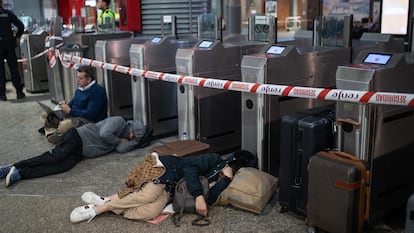Spanish court investigates whether massive blackout was due to a cyberterrorist attack
PM Pedro Sánchez says he will seek accountability from private operators and pledges changes: ‘This cannot happen again, ever’

Spain’s Audiencia Nacional, the central criminal court, has opened an investigation into the massive power outage that hit the Iberian Peninsula on Monday. In a decision issued on Tuesday, investigating Judge José Luis Calama authorized a probe into whether the massive energy crisis “could have been an act of cyber-sabotage against critical Spanish infrastructure.” In his statement, the judge admitted that the cause of the system failure “remains unknown at the current time,” but considered it necessary to initiate an investigation into the possibility of a “cyber-terrorist” attack, a crime that would fall within the court’s jurisdiction.
Before the court’s decision was announced, Red Eléctrica de España (REE), the grid operator, had ruled out the possibility that the blackout was caused by a cyberattack, human error, or by any unusual meteorological or atmospheric phenomenon. In a public appearance, Spanish Prime Minister Pedro Sánchez added that the government has “no conclusive information that it was a terrorist attack.” Although he did not rule out any theories, Sánchez called for caution until the matter is fully investigated.
The government leader also promised to seek accountability from private energy companies and pledged to make changes to prevent similar crises in the future. A separate government probe will seek to determine exactly what happened in the five seconds in which 60% of Spain’s electricity production was wiped out, representing 15 GW of energy consumption.
“Reforms will be implemented to ensure this doesn’t happen again, ever. We will hold private operators fully accountable,” said Sánchez, who added that the results of the investigation will be made public. Besides this internal probe, the Spanish leader said he will also ask the European Commission for an independent investigation.
“Citizens have questions, and we want to be able to answer them. We’re going to make changes, but we need to know what happened so [these changes] are as efficient as possible,” he added.

Meanwhile, Judge Calama of the Audiencia Nacional noted in his decision that the events of Monday “have created a critical situation for the well-being and sense of security of all citizens,” as “they have affected computer systems that support infrastructures that provide essential services to society, such as health, energy, industry, transportation, etc.”
Calama has ordered Red Eléctrica and the National Cryptology Center, part of the CNI national intelligence services, to send him separate reports on the causes that led to the blackout, for which he has given them a “non-extendable” deadline of 10 days. The judge has also requested a report from the National Police Intelligence Headquarters.
“Our society is increasingly based on a complex infrastructure system that underpins the productive sectors, service management, the financial system, and the development of civic life in general,” the judge noted in his decision. “These infrastructures are interdependent, which can trigger cascading security problems throughout the system itself, with the potential for unexpected and serious failures in basic services for the population, as happened [this Monday]. This type of infrastructure is especially attractive to terrorism due to the serious damage it can cause to the population.”
Calama also emphasized that the 2017 Cyberthreat Report from the National Cryptology Center stated that “the greatest danger lies in attacks originating from foreign states.” “This was the case of cyberattacks on Ukrainian electricity companies that caused a blackout in 2016, leaving millions of people without power.”
With additional reporting by Carlos E. Cué
Sign up for our weekly newsletter to get more English-language news coverage from EL PAÍS USA Edition
Tu suscripción se está usando en otro dispositivo
¿Quieres añadir otro usuario a tu suscripción?
Si continúas leyendo en este dispositivo, no se podrá leer en el otro.
FlechaTu suscripción se está usando en otro dispositivo y solo puedes acceder a EL PAÍS desde un dispositivo a la vez.
Si quieres compartir tu cuenta, cambia tu suscripción a la modalidad Premium, así podrás añadir otro usuario. Cada uno accederá con su propia cuenta de email, lo que os permitirá personalizar vuestra experiencia en EL PAÍS.
¿Tienes una suscripción de empresa? Accede aquí para contratar más cuentas.
En el caso de no saber quién está usando tu cuenta, te recomendamos cambiar tu contraseña aquí.
Si decides continuar compartiendo tu cuenta, este mensaje se mostrará en tu dispositivo y en el de la otra persona que está usando tu cuenta de forma indefinida, afectando a tu experiencia de lectura. Puedes consultar aquí los términos y condiciones de la suscripción digital.









































